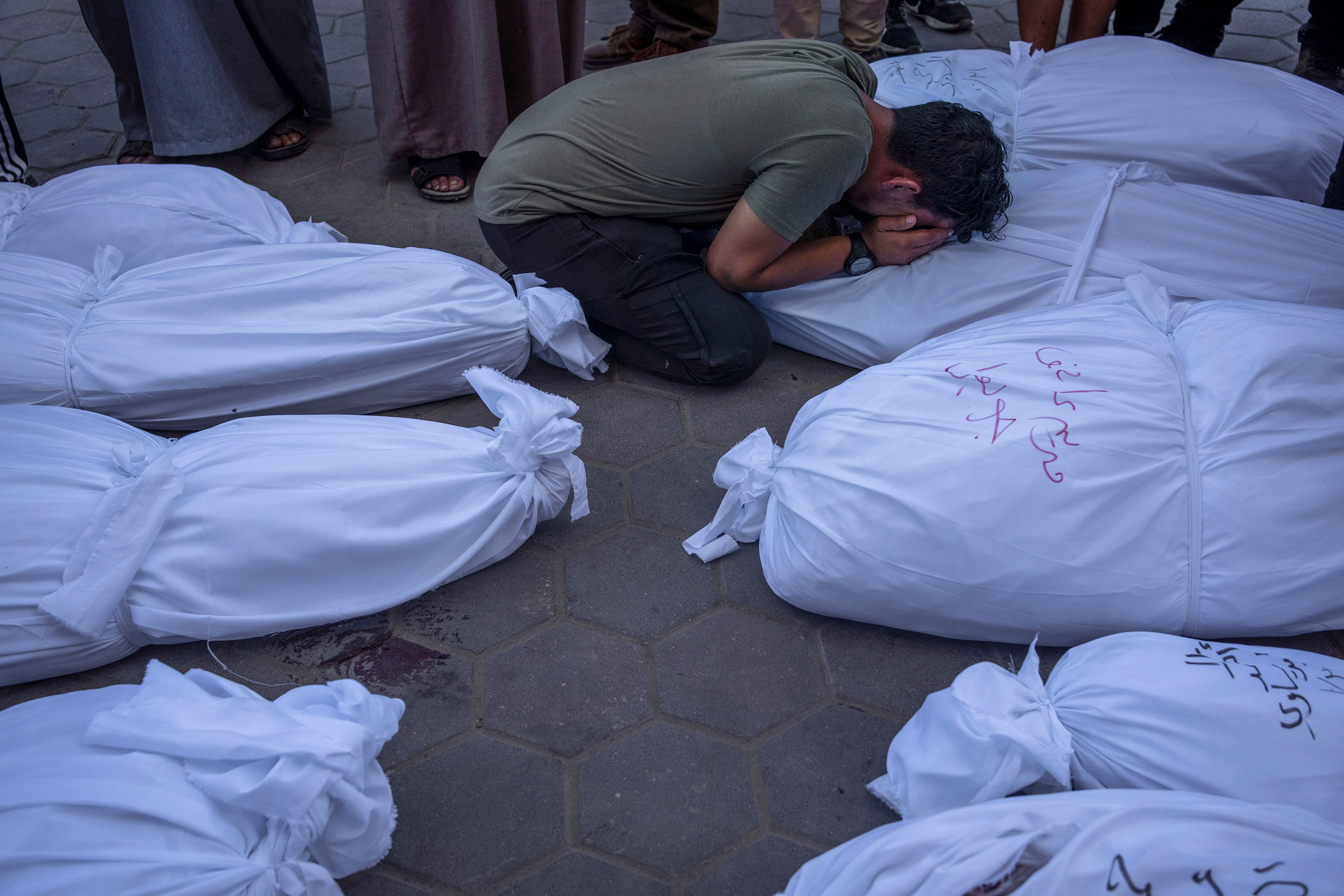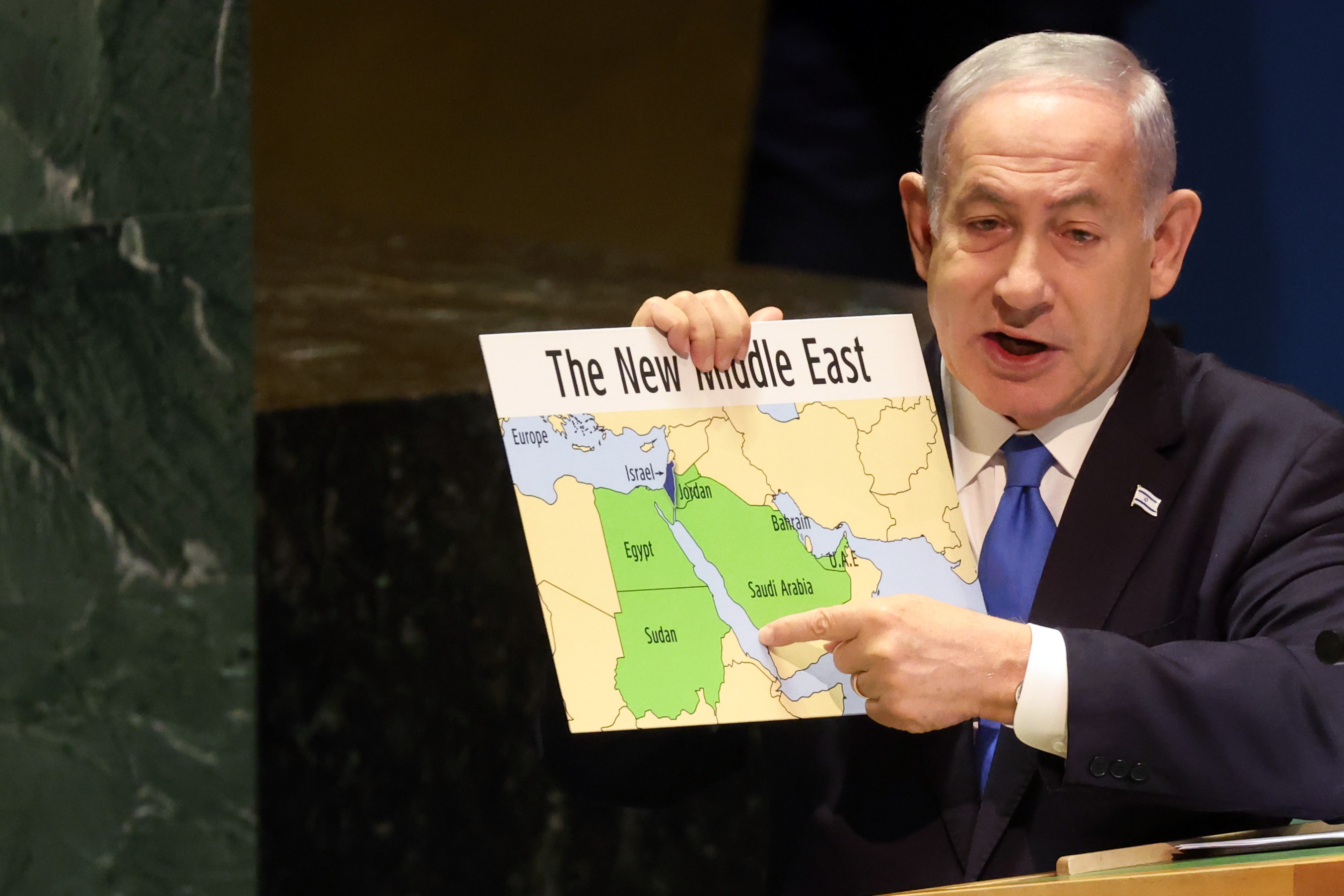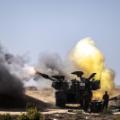Our live coverage of the Israel-Hamas war has moved here.
November 6, 2023 Israel-Hamas war
By Kathleen Magramo, Sana Noor Haq, Ed Upright, Elise Hammond, Eric Levenson, Maureen Chowdhury and Steve Almasy, CNN
Palestinian Health Ministry says Gaza death toll surpasses 10,000
From CNN's Kareem El Damanhoury and Abeer Salman

The number of Palestinians killed in Gaza since Hamas attacked Israel on October 7 has surpassed 10,000, according to the Palestinian Ministry of Health in Ramallah drawing from sources in the Hamas-controlled enclave.
More than 70% of those killed were children, women and the elderly, while some 24,000 people have been injured, according to the ministry.
On Monday, the Hamas-controlled health ministry in Gaza said the death toll in the enclave had risen to more than 10,000.
Some background: Israel declared war on Hamas after the Islamist militant group launched a brutal attack on October 7, killing 1,400 in Israel and kidnapping more than 240. Israel retaliated by launching an air and ground offensive on Gaza, vowing to eliminate the militant group.
Thousands more Palestinians have been killed in Gaza in the past month than during conflicts with Israel spanning the past 15 years.
The United Nations Human Rights Office said the attacks last week on Gaza’s largest refugee camp “could amount to war crimes” given the scale of casualties and destruction.
More than 60% of Gaza’s medical facilities out of service, Palestinian Authority minister says
From CNN’s Kareem El Damanhoury and Abeer Salman
More than 60% of Gaza’s hospitals and medical centers are now out of service, according to a statement from the Palestinian Authority Minister of Health Mai al-Kaila.
Al-Kaila said that 16 of 35 hospitals as well as 51 of 72 medical centers are no longer operational due to the fuel and medical supply shortages as well as the Israeli bombardment.
The Palestine Red Crescent Society has also issued an urgent appeal to international health and relief organizations to provide aid and supplies to Gaza, warning about the repercussions of fuel shortages in the Al-Quds Hospital that is sheltering 14,000 displaced people.
“The hospital’s fuel reserves will run out within 48 hours, and life-saving equipment, neonatal incubators, and intensive care units will cease to function,” the Red Crescent said in a statement Monday.
Israeli airstrikes hit near Gaza’s Al-Quds Hospital, Palestine Red Crescent Society says
From CNN’s Abeer Salman and Kareem El Damanhoury
Israeli airstrikes hit near the Al-Quds Hospital in Gaza City on Monday night, according to a statement by the Palestine Red Crescent Society.
“[Israel] targeted the vicinity of Al-Quds Hospital in the Gaza Strip with two missiles, approximately 50 meters away from the hospital gate,” the group said.
CNN reached out to the Israeli military but did not immediately hear back.
In previous statements, the Israeli military maintained that it has requested civilians in Gaza City move south of Wadi Gaza, a waterway bisecting the center of the enclave, for safety. Earlier, it said it had struck 450 Hamas targets in the strip in 24 hours.
On Sunday, large explosions rocked the vicinity of the Al-Quds hospital, resulting in casualties, including a number of deaths, according to the Red Crescent group.
More than 10,000 people killed in Gaza, Hamas-controlled health ministry says. Here's what else to know
From CNN staff
More than 10,000 people have been killed in Gaza since Israel launched its military offensive nearly a month ago, the Hamas-controlled health ministry in the Palestinian enclave said Monday.
Israel declared war on Hamas after the Islamist militant group launched a brutal attack on October 7, killing 1,400 in Israel and kidnapping more than 240. Israel retaliated by launching an air and ground offensive on Gaza, vowing to eliminate the militant group.
The Israel Defense Forces (IDF) said Monday it has struck hundreds of Hamas targets and taken control of a military compound in Gaza over the last 24 hours.
Inside the enclave, communication services are slowly being restored to some parts of Gaza after it was cut out over the weekend. On average, about 30 trucks carrying humanitarian aid have been passing through the border each day, the Palestinian Red Crescent Society in Ramallah said. However, this still does not include fuel supplies.
Here's what else to know:
- Israeli offensive: The IDF said it hit more than 450 Hamas targets and captured additional territory inside Gaza in the last day, including a military compound. IDF spokesperson Lt. Col. Peter Lerner said forces are moving toward Gaza City. Another spokesperson, Rear Adm. Daniel Hagari, said Sunday that Israeli troops have split Gaza into two territories — north and south.
- Control of Gaza: Israel will have the "overall security responsibility" in Gaza for an "indefinite period" after the war ends, Israeli Prime Minister Benjamin Netanyahu claimed in an interview with ABC News. The prime minister also repeated that Israel will not allow a general ceasefire until all hostages are released by Hamas. But he said he was open to short pauses.
- Death toll: Ashraf Al Qudra, spokesperson for the Hamas-controlled Ministry of Health in Gaza, said at least 10,022 Palestinians in the enclave had been killed by Israeli strikes since October 7, including 4,104 children, 2,641 women and 611 elderly people. Those numbers suggest about three-quarters of the dead are from vulnerable populations. It's unclear how many combatants are included in the total. CNN cannot independently verify the numbers. UN Relief Chief Martin Griffiths said that more than 10,000 people killed in one month "defies humanity."
- Situation inside Gaza: Communication services are slowly returning in some parts after they were cut out across the enclave, according to local providers. Communications in Gaza were disrupted on Sunday for a third time since October 7, with humanitarian organizations saying they were unable to reach employees inside the territory. European Union Commission chief Ursula von der Leyen said the bloc will ramp up aid to Gaza by 25 million euros ($27 million).
- Rafah crossing: Additional wounded Palestinians arrived in Egypt for treatment through the Rafah border crossing on Monday evening, according to an Egyptian border official. This brings the total number of wounded Palestinians transferred to Egypt to 101, according to a CNN tally. The crossing is back open Monday after being temporarily closed over the weekend following an Israeli airstrike that hit a Palestinian Red Crescent ambulance. This means foreign nationals and Egyptian citizens whose names were included in a November 1 list will be allowed to cross again, the General Authority for Crossings and Borders in Gaza said.
- Growing calls for a ceasefire: The heads of 18 United Nations agencies and major aid organizations issued a rare joint statement Sunday calling for an “immediate humanitarian ceasefire” in Israel and the Palestinian territories. UN Secretary-General Antonio Guterres reiterated this call on Monday. Queen Rania Al Abdullah of Jordan has also called for a ceasefire along with South Africa and Chad who have announced they will recall diplomats from Israel for “consultation” in response to the war. In a private session Monday, the UN Security Council failed to reach a consensus on a draft resolution aimed at halting the conflict.
- Blinken trip: US Secretary of State Antony Blinken met with Turkish Foreign Minister Hakan Fidan in Ankara on Monday. Ahead of leaving the country, Blinken stressed “American engagement” in the war. Blinken met with Iraqi Prime Minister Mohammed Shia al-Sudani for more than an hour in an unannounced visit to Baghdad Sunday, emerging to say the meeting was "productive." It came after he visited Israel on Friday and met with key Arab leaders on Saturday in Jordan.
- Tell us your story: As the conflict between Israel and Hamas enters a new stage in the Middle East, we want to hear from Jewish, Muslim and Arab communities in the United States. Have you felt the need to adjust your daily life amid heightened fears of hate-motivated incidents? If you’re willing to share your story, we want to hear from you. Tell us about your experience here.
Netanyahu: Israel will have “overall security responsibility” for Gaza for “indefinite period” after war ends
From CNN's Kareem El Damanhoury and Mitchell McCluskey

Israel will have the "overall security responsibility" in Gaza for an "indefinite period" after the war ends, Israeli Prime Minister Benjamin Netanyahu claimed in an interview that aired on ABC News on Monday.
Gaza should be governed by “those who don’t want to continue the way of Hamas," Netanyahu said, before adding, "I think Israel will, for an indefinite period, will have the overall security responsibility because we’ve seen what happens when we don’t have it.”
The prime minister also repeated that Israel will not allow a general ceasefire until all hostages are released by Hamas.
However, Netanyahu said he was open to short pauses to take place.
"As far as tactical little pauses, an hour here, an hour there. We've had them before, I suppose, we'll check the circumstances in order to enable goods, humanitarian goods to come in, or our hostages, individual hostages to leave. But I don't think there's going to be a general ceasefire," he said.
Netanyahu also addressed the role of Iran and Hezbollah in the conflict, cautioning them from getting more involved.
"I think they've understood that if they enter the war in a significant way, the response will be very, very powerful and I hope they don't make that mistake," Netanyahu told ABC.
US planning to transfer $320 million in precision bomb equipment to Israel in sale approved earlier this year
From CNN's Natasha Bertrand, Alex Marquardt and Oren Liebermann
The United States is planning to transfer $320 million worth of precision-guided bomb equipment to Israel, according to three people familiar with the matter, amid Israel’s ongoing aerial bombardment of Gaza as part of its war on Hamas.
The sale of the Spice Family Gliding Bomb Assemblies — a type of precision bomb kit that can turn unguided bombs into GPS-guided munitions — to Israel was approved by the relevant US congressional committees several months ago, before Hamas attacked Israel on October 7 and sparked a war, one of the sources said.
But the State Department did not formally notify congressional leaders that the transfer was moving forward until October 31, according to the sources and a formal notification reviewed by CNN.
The notification, addressed to the Speaker of the House, House Foreign Affairs Committee, and Senate Foreign Relations Committee, says that defense contractor Rafael USA would transfer “defense articles, technical data, and defense services to support procurement, inspection, assembly, testing, and shipment of Spice Family Gliding Bomb Assemblies for end-use by the Ministry of Defense for Israel.”
The Wall Street Journal first reported that the US plans to transfer the kits.
Some background: SPICE stands for Smart, Precise Impact, and Cost Effective. The weapons are produced by Rafael USA, the American branch of one of Israel’s most prominent arms manufacturers.
The guidance kits are similar to JDAMs — or joint direct attack munitions — produced by the US in that they are also fin and steering kits that turn unguided “dumb” bombs into guided “smart” bombs. The US began expediting the delivery of JDAMs to Israel shortly after the start of the war, a senior defense official said in late October, which was one of Israel’s top needs, along with interceptor missiles for its aerial defense systems.
A State Department official told CNN that “as a matter of policy, we are unable to comment on or confirm specific defense trade licensing or compliance activity.”
The transfer comes as several countries have called for a ceasefire in Gaza, as the civilian death toll from Israeli air strikes continues to rise. National Security Council spokesperson John Kirby said on Monday that “many, many thousands of innocent people” have been killed in Gaza, and that the US has only seen “some indications” in “certain scenarios” that Israel is making an effort to minimize the civilian death toll there.
US forces attacked 8 times since Friday in Iraq and Syria as Iranian-backed militias ramp up assaults
From CNN's Haley Britzky,
American troops were attacked an additional eight times since Friday morning by one-way attack drones and rocket barrages in Iraq and Syria as US forces face ramped-up assaults by Iranian-backed groups.
The new incidents — one on Friday afternoon, another on Saturday, five more on Sunday and one on Monday morning — mark a total of at least 38 attacks on US and coalition forces in those two nations since October 17, 10 days after the start of a bloody war between Israel and Hamas.
CNN has reported that Iran is seeking to capitalize on the backlash to US support for Israel, and while Tehran may not be explicitly directing the groups’ attacks, it does appear to be encouraging them.
While the increase in attacks started after the brutal attack by Hamas on Israel on October 7, Pentagon officials have declined to draw a direct correlation between the increase in attacks and the conflict in Gaza, saying instead that Iran has long sought to force the US from the region.
“Iran’s strategic objective for a very long time, way before October 7, was to force US forces to withdraw from the region,” a senior defense official said on October 30. “We have maintained tens of thousands of US forces across the region for decades. We have increased our air defense posture. Most of these attacks have been unsuccessful. But Iran’s strategic objective has not changed.”
The dozens of attacks have largely focused on US and coalition forces at Al-Asad Airbase, Iraq, and al-Tanf Garrison, Syria, with some attacks near Mission Support Site Green Village in Syria; Bashur, Iraq; Mission Support Site Euphrates, Syria; Erbil Airbase, Iraq; Shaddadi, Syria; Rumalyn Landing Zone, Syria; and Tall Baydar, Syria.
On Friday afternoon, a one-way attack drone was shot down near Shaddadi, Syria, with no casualties or infrastructure damage reported, a US official updated on Monday. On Saturday morning, another one-way attack drone was shot down near Shaddadi with no casualties or infrastructure damage reported.
The attacks increased in frequency on Sunday totaling five separate incidents; one-way attack drones were shot down near Tall Baydar, Syria; al-Tanf Garrison, Syria; and three times near Al-Asad Airbase, Iraq. One attack on Al-Asad also included a multi-rocket attack alongside multiple one-way attack drones.
Another one-way attack drone was shot down near Tall Baydar, Syria, on Monday morning. None of the attacks over the weekend resulted in casualties or damage to infrastructure, according to the US official.
“Most of these attacks were successfully disrupted by our military,” the US official said. “Most failed to reach their targets, thanks to our robust defenses.”
Read more about the attacks US forces are facing in Iraq and Syria.
UN Security Council fails to agree on resolution to halt fighting in Gaza
From CNN's Richard Roth and Hamdi Alkhshali
In a private session Monday, the United Nations Security Council failed to reach a consensus on a draft resolution aimed at halting the ongoing conflict in the Middle East.
“There is no agreement at this point,” said Deputy US Ambassador to the United Nations Robert Wood.
The so-called E-10, consisting of 10 non-permanent member states of the Security Council, has drafted a resolution.
However, the United States and the United Kingdom, permanent members who possess veto power, have opposed it. Western powers, particularly the US and UK, are resistant to including language in the resolution that calls for an immediate ceasefire, a proposition supported by several other Council members.
There have been discussions about humanitarian pauses, Wood said, "and we're interested in pursuing language on that score." But he added there was disagreement within the Security Council on whether that would be acceptable.
China's UN Ambassador Jun Zhang, echoed the sentiments expressed by Secretary-General António Guterres, emphasizing that "Gaza is a graveyard for children." Zhang called for an urgent ceasefire to facilitate the delivery of humanitarian aid to Gaza.
“As we speak, Palestinian civilians continue to be killed. Children are bearing the brunt, as several US officials have stated already. Gaza is becoming a graveyard for children. No one is safe,” Zhang said.
The United Arab Emirates emphasized the importance of upholding the rules of warfare. UAE Ambassador Lana Zaki Nusseibeh, who co-initiated the meeting with China, underlined that discussions within the Council were ongoing, and nations were working to bridge their differences.
“We condemn the seventh October attacks by Hamas on Israel. We also condemned the indiscriminate attacks by Israel on the Gaza Strip. We express our grave concern that the continued detention of hostages and demand the immediate and unconditional release of all hostages, as well as their safety well-being and humane treatment consistent with international law,” Nusseibeh said.
Nusseibeh added that “the killing and maiming of children, attacks on schools and hospitals and the Gaza Strip and denying children access to humanitarian assistance are all very grave violations. against children.”
During the meeting, UN humanitarian officials briefed the Security Council on the dire humanitarian situation in the region.
Previous attempts to pass resolutions in the Security Council have faced challenges, including two US vetoes, further underscoring the complexity of reaching a consensus on this critical issue.


